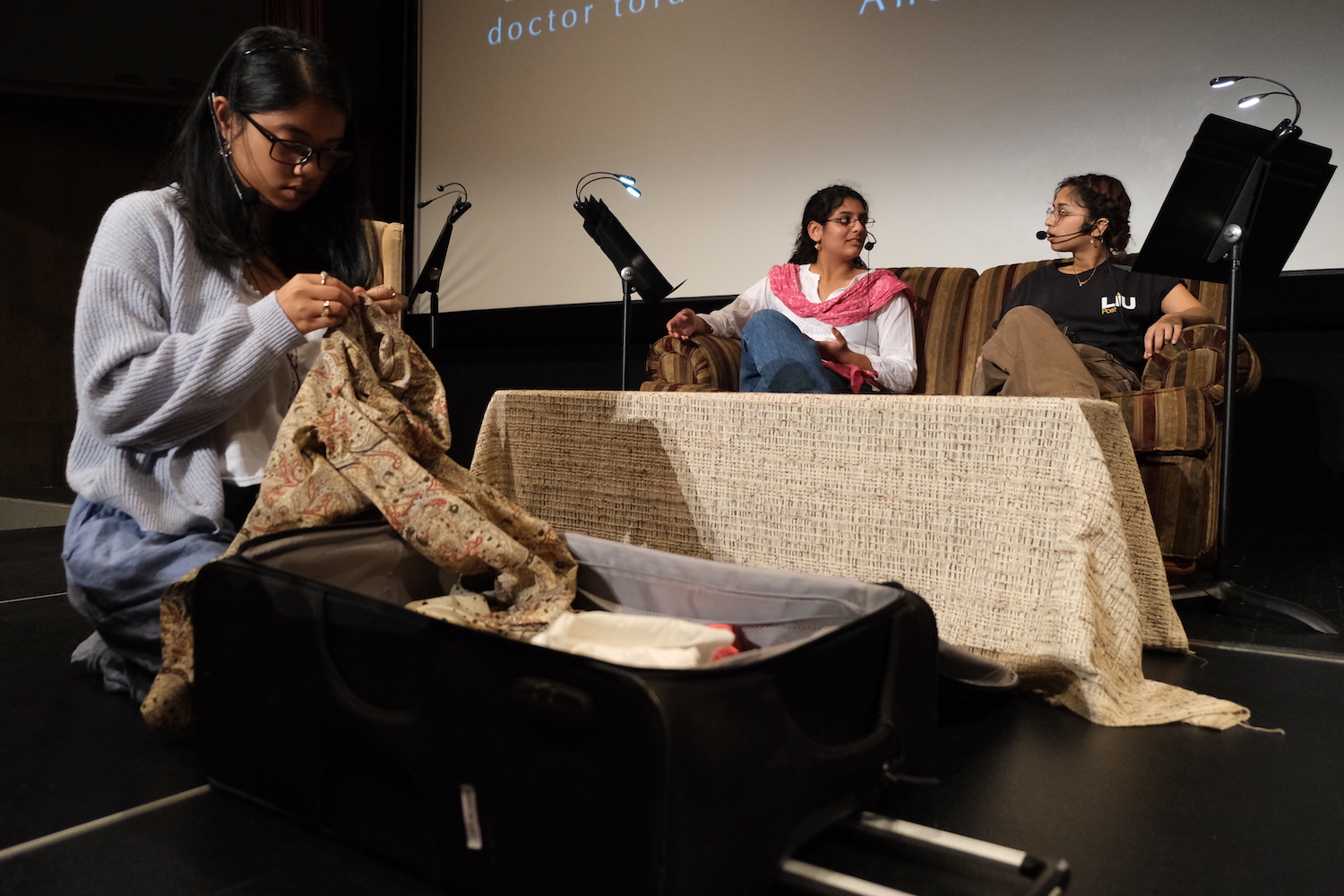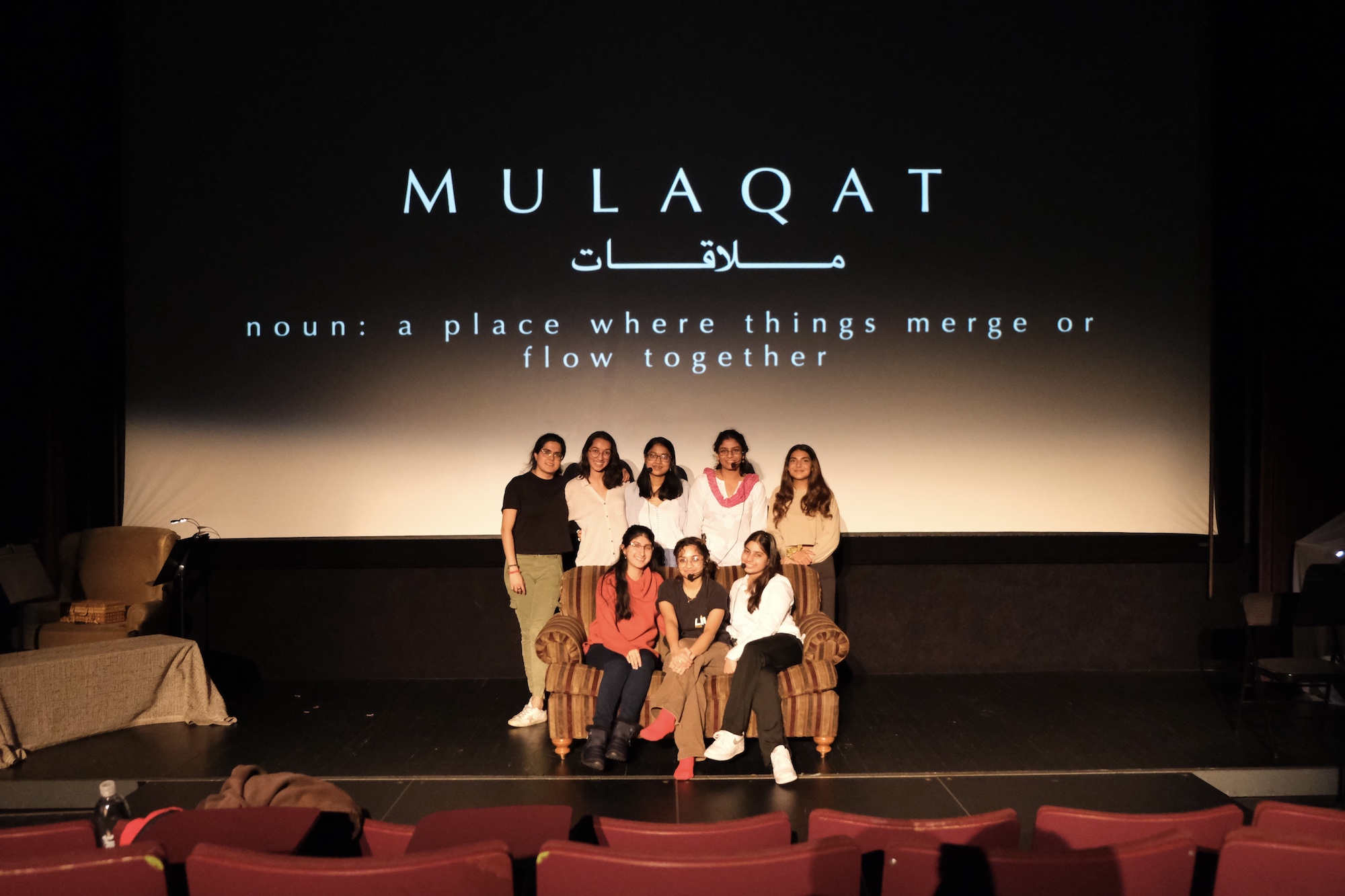
c/o Andrew Lu, Photo Editor
A staged reading of “Mulaqat,” a senior theater thesis written by Malaika Fernandes ’23 and directed by Avanti Sheth ’23, went up in the Ring Family Performing Arts Hall on Friday, Dec. 2 at 8 p.m. following a dress rehearsal the previous day (I was the stage manager for this production). The play revolves around South Asian culture and language.
“How can we stretch our understanding of language to stretch our understanding of community?” asked Fernandes in her pre-show announcement.
“Mulaqat” shares a story of three women navigating conversations surrounding miscarriages, the Neonatal Intensive Care Unit (NICU), cancer, and grief, while also capturing the strong bond between them as they make lemon pickle and discuss baby names. Tanya (Mallika Srinivas ’25) and her husband Imran live in the United States. They’re expecting a baby, but Imran has to travel to the United Kingdom for work, leaving Tanya alone. In light of this, Tanya’s mother, Damini (Arushi Khare ’25), who speaks only Marathi and is from Pune, India, and her mother-in-law, Noor (Mohona Yesmin ’23), who speaks only Urdu and is from Lahore, Pakistan, rush to Tanya’s home to take care of her. Since the two women can’t understand each other, Tanya, who speaks both languages, serves as a mediator in their conversations.
When asked about how she came up with the idea for her thesis, Fernandes spoke about the idea of contrasting the universal with the specific.
“I started with this idea of language that is universal and language that is not,” Fernandes said. “And I realized that I wanted to do a playwriting thesis that involved something so far outside of what the audience knows. We’re talking about the South Asian diaspora. We’re talking about languages that they might never have heard of. I also wanted to pair that with something that is very familiar, and family and motherhood are familiar to a lot of people.”
Fernandes went on to talk about how she hoped to evoke similar feelings from the audience, even if they weren’t all South-Asian-identifying.
“I don’t think this play is universal in the sense that it captures everyone’s experiences,” she said. “I hope that it is specific enough that it makes you respond to things in a way that feels universal. Everyone can share the same laugh, and everyone can share the same fear, or anger, or something else when watching the same play.”
When thinking about which languages to include in the show, Fernandes did not ask for people who spoke any specific languages, but rather if people in the Wesleyan community knew any South Asian language well enough to translate a full-length play.
“I asked who spoke any languages generally, and when two wonderful people showed interest, [Zuha Anjum ’25 and Khare], I went with Urdu and Marathi, the languages that they spoke [respectively].”
Originally, Fernandes had the idea that each person, depending on their cultural and linguistic background, would each take something different away from the show. For example, if an audience member knew Urdu, they’d have a better understanding of Noor’s character compared to Damini’s. If an audience member knew neither language, they could try to follow how Tanya, the only English-speaking character in the show, connected the conversation between Noor and Damini and, through that, piece together the storyline. But Fernandes realized that this lead to conversations in which Noor or Damini said something, and then Tanya essentailly repeated the same sentence back to them. Eventually, Fernandes made the decision to include supertitles, the theater version of subtitles, which were projected on a screen behind the actors so that audience members could follow along with what the characters were saying.
“It was getting boring, repetitive, and really slow,” Fernandes said. “And I realized [that], if I wanted the audience to be on board with me, it’s better they put in a little more work to watch this play. And as a result of putting in that work, they’d gain something that would be a much better experience.”
So Fernandes added supertitles. Projections Designer Sanaa Mia ’26 created them, and Projections Operator Mayana Puri ’23 changed the slides during the show with Stage Manager Sabrina Ladiwala ’24 cueing her. In addition to making the supertitles, Mia added in transitions between some of the lines at integral parts of the show as denoted by the stage directions in the script. One moment that comes to mind is when Damini accidentally tells Tanya that she’s had multiple miscarriages, saying: “every time I was pregnant.” Tanya, shocked and confused, looks up at and points to the supertitles, and confronts Damini.
“Every time,” says Tanya.
“What?” says Damini.
“Every time you were pregnant?” Tanya asks.
“I didn’t say that,” Damini says, and the supertitles fade from the screen.
Another moment that showcased the supertitles was the scene where Tanya and Damini are making lemon pickle together. Instead of word-for-word translations, the instructions for how to make lemon pickle which Damini is giving to Tanya appear in a list on the screen. Because Damini doesn’t use a recipe, the instructions get quite messy. Lines are sometimes crossed out, and little notes are added in the margins.
Fernandes was also able to incorporate images on the screen. Before Noor arrives, she sends letters to Tanya. However, since Tanya can’t read Urdu, Noor draws sketches to communicate with her. One of her sketches captures a man and a woman sitting together, smiling at each other. The woman is meant to be Tanya, and the man is Imran. Another one shows the couple entering a grand palace with a baby swaddled in Tanya’s arms. The sketches were animated, so it looked like someone was drawing them in real time as they appeared on the screen.

c/o Andrew Lu, Photo Editor
Since this production was a staged reading, there was minimal blocking, the actors had their scripts on stage, and stage directions were read out loud by Mishaa Vohra ’26.
I asked Sheth about finding a balance between adding enough blocking for the actors and not too much.
“I’d never even watched a staged reading before, so finding that balance was hard to navigate at first,” she said. “But as soon as I realized that the whole purpose is to have actions and highlight moments that are really important in the script, as soon as I caught those moments in rehearsal, I think ideas just popped into my head.”
She went on to talk about how helpful it was to get ideas from the cast and crew, as well as from Fernandes.
“Getting ideas from cast members and team members, and having Malaika there, was a huge help,” she explained. “Having the playwright in the room with you could be intimidating at first but it was really nice to have Malaika to lean on in the rehearsal room. Ask her questions about why she wrote these moments the way she did, and what she was hoping to bring out.”
When Noor is reciting a letter that she has sent to Tanya, a sketch materializes on the screen and Noor walks on stage, standing a bit away from Tanya and Damini, who are sitting on the couch center stage. Noor wishes Tanya a happy two-year anniversary, and Tanya, who had completely forgotten, turns to Damini, who starts asking her how she could forget her own anniversary. Tanya then asks how could her mother forget her anniversary to which Damini asks if Imran wished her a happy anniversary.
This exchange between Tanya and Damini, continues until Tanya stops the recitation.
“Okay, I don’t want to look at this anymore,” says Tanya.
“May the rest of your lives be as filled with love,” says Noor.
“Tanya stuffs the card in a drawer,” read the stage directions.
Srinivas walks over to Yesmin and closes her script, implying that Tanya has put the note away. The way this flowed together—the physical space between Tanya and Noor bridged by the words, and then with Tanya closing the distance—was captivating.
Another moment that I really loved was the ending. Both Noor and Damini have gone back home, and Tanya is alone in her house with her baby in the NICU. We hear Damini and Noor’s parting words to Tanya and the audience over the speakers. As the audio plays, we see Khare and Yesmin pack up the house. They wrap up the tablecloth and move some of the furniture pieces off stage. By the end of the show, the stage is barren, with only Srinivas sitting on the couch. She exits and comes back with the wrapped table cloth, representing her baby, as Vohra reads out the final stage directions.
“Tanya and the baby are alone in the empty house. End of play.”
After the show, Fernandes and Assistant Professor of Theater Katie Pearl held a talk-back session with the audience to gauge their experience with the show. It was profound to hear how deeply this show had impacted them. Many people told stories about their own cultures and families.
“One of the most magical things to come from this experience is that, even now, people are approaching me to tell me stories of their mother or their grandmother or someone else in their life, and that feels so wonderful,” remarked Fernandes. “I don’t know if the characters in this play are what’s important to real people, I think what’s important to them is their own families or any unconditional love they are seeing in their lives and this is a play that might remind them of that.”
Sheth had similar things to say about how this show resonated with audience members and herself.
“It was so touching to know that this play reached so many different people from so many different places around the world,” Seth said. “It might have reminded them of their mom or grandma and personally, Damini reminded me of my mom and my grandma a lot. And it was nice to be in a rehearsal room where I would say random things from my childhood that I would remember my grandma saying and people in the room would automatically go ‘yes, exactly, same here’ and that brought so much warmth and that’s something I want to keep with myself after this show.”
As a South Asian myself, it meant a lot to me to be the stage manager for Mulaqat. Being able to see the script grow over the summer, to have in-depth conversations about South Asian culture with our team, to watch the rehearsal process unfold, and to cue Puri for the projections during the show (giving the audience a way to understand Fernandes’ words) has truly been an unforgettable experience. I’m so grateful to have been a part of sharing this story and being able to connect with other members of the South Asian community.
Sabrina Ladiwala can be reached at sladiwala@wesleyan.edu.